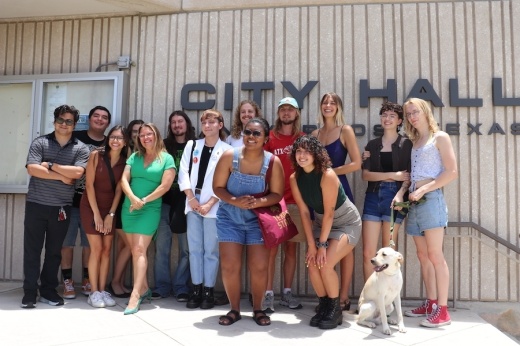Organizers have independently verified 4,600 signatures, while the city charter only requires 4,182, according to a press release from Mano Amiga.
This comes on the heels of Austin voters approving Proposition A in the May 7 election that ended low-level marijuana enforcement. The initiative was also organized by Ground Game Texas, which is working on decriminalization measures throughout the state.
Mano Amiga launched the ballot initiative campaign in September, and while the initiative will not legalize marijuana, it will end all criminal penalties for possession of up to 4 ounces of marijuana, if approved by voters.
The team submitted 11,256 signatures, the largest ballot initiative the city of San Marcos has ever seen, according to Sam Benavides, communications director for Mano Amiga.
"I can tell you right now that the people that worked most closely on this campaign are damn-near burnt out because it was exhausting," Benavides said. "But this moment right here and knowing that San Marcos is going to be a better, more safe place because of it makes it all worth it."
By securing decriminalization ballot initiatives, not just in San Marcos but across the state, local criminal justice reform can be brought to communities, co-founder and executive director of Ground Game Texas Julie Oliver said.
"We know that there are thousands upon thousands of people of color in jail who have been cited, just because of the color of their skin, carrying misdemeanor amounts of marijuana," Oliver said.
Black citizens and their white counterparts use drugs at similar rates. However, the imprisonment rate of Black citizens for drug offenses is six times greater than that of their white counterparts, according to the NAACP.
"We exist to lift up workers, lift wages, decriminalize marijuana ... bringing these progressive, popular issues to people; direct democracy so that they can actually vote on them in their communities," Oliver said.
With the signatures submitted, the ballot initiative will be brought to City Council, at which point the ordinance can adopt it without actually reaching the ballot. However, Benavides said they are strongly urging the council to leave the item up for voter approval or denial.
"As an elected official, it's my responsibility to listen to my constituents and be the voice of the people," San Marcos Council Member Alyssa Garza said. "I think it's quite obvious that a substantial portion of the San Marcos electorate has spoke loud and clear ... it's now the duty of the San Marcos City Council to give voters the opportunity to approve this at the polls in November."





